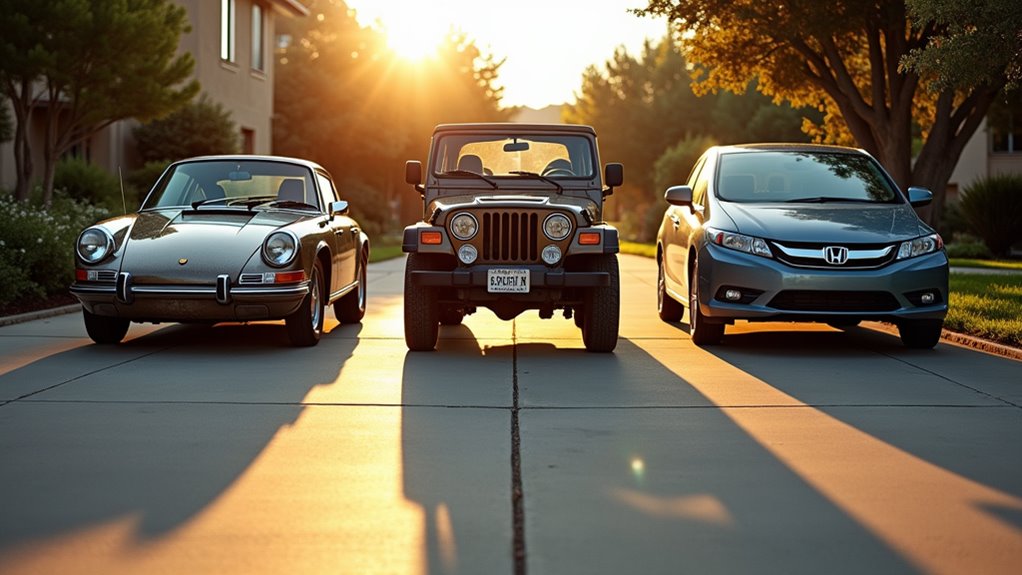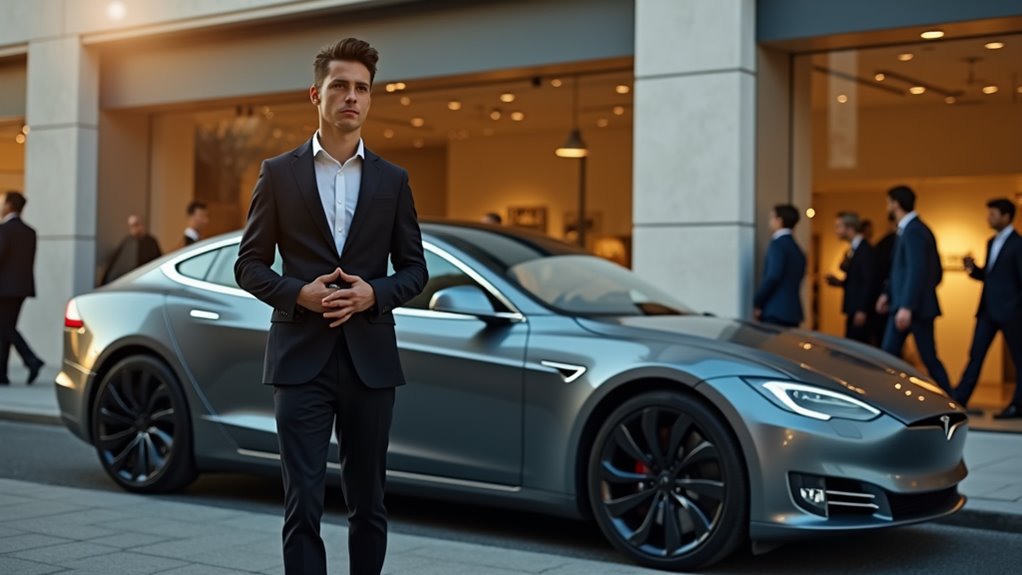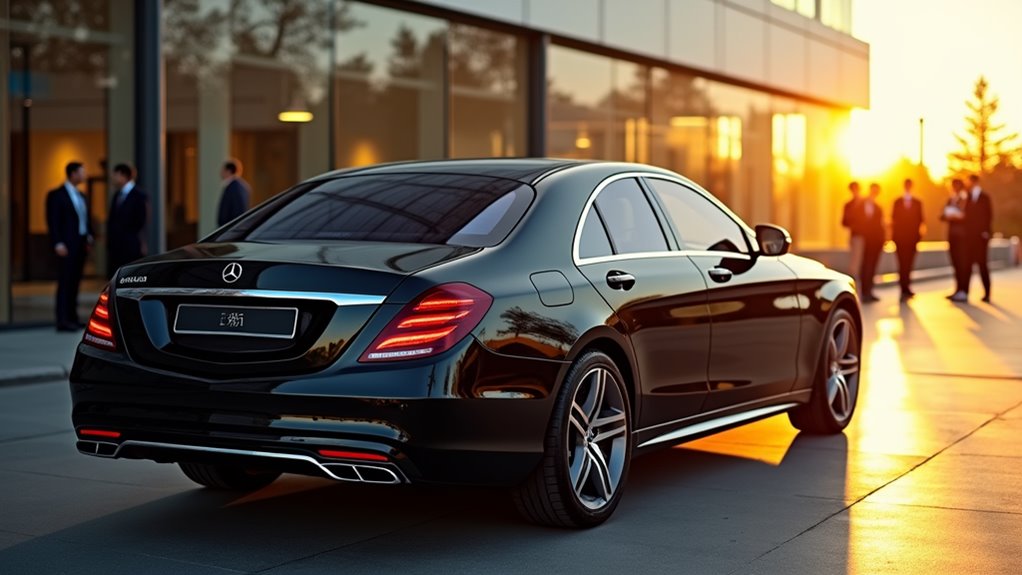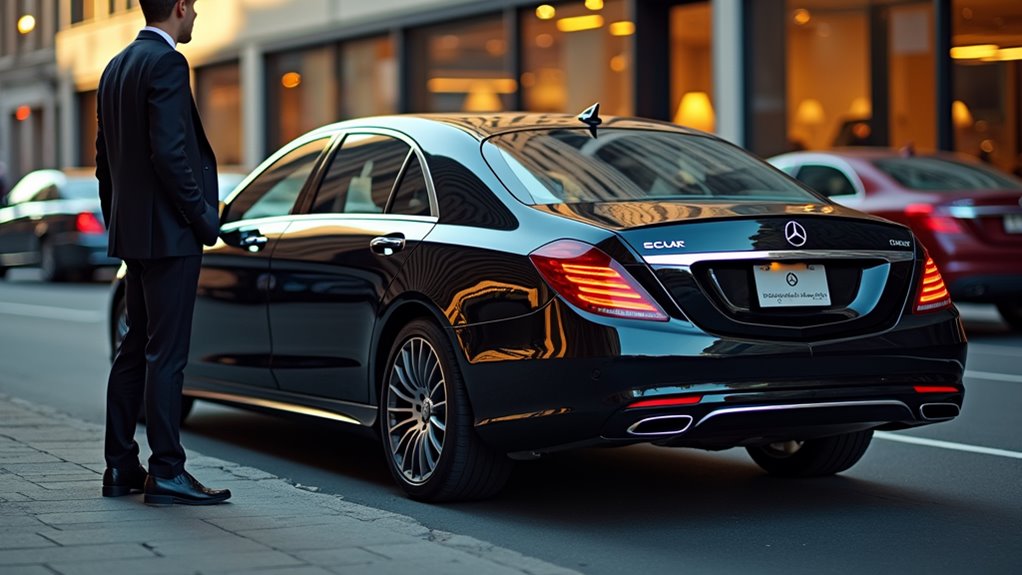Your car speaks volumes about your identity before you ever say a word. It's a powerful symbol that instantly communicates your values, status, and personality to the world. From the brand you choose to how well you maintain it, every aspect sends specific social signals. A Tesla suggests environmental consciousness and tech-savvy thinking, while a well-maintained classic car indicates attention to detail and appreciation for tradition. Even your color choice reveals character traits – white projects cleanliness, black suggests power, and red signals ambition. Understanding these unspoken messages can help you make automotive choices that truly reflect who you are.
Key Takeaways
- Your car's brand and model instantly communicate social status, financial standing, and career success to others within seconds of their first encounter.
- Vehicle maintenance and cleanliness reflect personal organization habits and attention to detail, influencing professional and social perceptions.
- Color choice reveals personality traits, with black suggesting sophistication, red indicating boldness, and white demonstrating practical mindedness.
- Environmental consciousness is immediately apparent through vehicle type, with electric or hybrid choices signaling commitment to sustainability.
- The type of vehicle signals life priorities, with luxury cars suggesting status-consciousness, while practical vehicles indicate family-focused values.
The Psychology Behind Car Choices

Nearly every car purchase decision stems from both conscious and subconscious psychological factors.
You're not just buying transportation – you're making a statement about your identity, values, and aspirations. Your choice reflects deep-seated needs for status, security, or self-expression.
Research shows that you'll often select vehicles that align with your personality traits. If you're extroverted, you might gravitate toward bold colors and distinctive designs.
If you value practicality, you'll likely focus on reliability and efficiency. Your life stage and personal circumstances also shape these choices – new parents typically prioritize safety features, while young professionals might seek vehicles that project success.
Understanding these psychological motivations can help you make more informed decisions that truly satisfy your needs rather than just following trends.
Status Symbols On Wheels
Luxury vehicles have long served as rolling declarations of wealth and achievement. When you drive a high-end car, you're not just purchasing transportation – you're investing in a powerful social signal that broadcasts success, taste, and status to others.
Your choice between a Mercedes-Benz, BMW, or Rolls-Royce speaks volumes about how you want to be perceived. Each brand carries its own cultural weight and social implications. A Tesla suggests you're tech-savvy and environmentally conscious, while a Porsche often indicates you value performance and precision.
But status symbols aren't limited to luxury brands. Even within mainstream manufacturers, choosing a top trim level or limited edition model reflects your desire to stand out and showcase discernment.
The message is clear: your car remains one of society's most visible indicators of social position.
Brand Perception and Social Identity

Beyond status symbols, the brands we choose shape our social identity in profound ways. Your car brand creates immediate associations in others' minds, reflecting your perceived values and lifestyle choices.
Whether you drive a Volvo for safety, a Tesla for innovation, or a Jeep for adventure, you're broadcasting specific personality traits to the world.
These automotive choices often align with your social groups and aspirations. You'll notice how certain brands cluster in specific neighborhoods or professional circles, creating tribal affiliations.
A Subaru might signal environmental consciousness, while a BMW suggests career success.
Remember, though, that these perceptions vary by culture and region – what's prestigious in one area might be ordinary in another.
Your car brand becomes part of your personal narrative, influencing how others interact with you before you even speak.
Car Colors and Personality Traits
Your car's color reflects more than just aesthetic preferences – it provides insights into your personality traits and how you want others to perceive you.
Studies show that drivers who choose white cars often value cleanliness and order, while those selecting black vehicles tend to prefer power and sophistication.
Red car owners typically seek attention and energy, while silver suggests innovation and blue indicates stability and trustworthiness.
Color Choices Reveal Character
When selecting a car color, drivers reveal more than just their aesthetic preferences – they showcase distinct personality traits and emotional tendencies.
If you've chosen a black car, you're likely projecting power, sophistication, and professionalism. White vehicle owners often value cleanliness, organization, and simplicity in their lives.
Red car drivers tend to be energetic, ambitious, and attention-seeking, while those who opt for blue typically demonstrate stability and trustworthiness.
Gray or silver car owners usually prefer practicality and innovation, staying current with modern trends. If you're driving a green vehicle, you're probably down-to-earth and balanced, while yellow or orange suggests you're optimistic and adventurous.
These color choices often align with your inner characteristics, whether you're conscious of it or not.
Popular Hues and Psychology
Research consistently shows that the most popular car colors worldwide reflect deep-rooted psychological patterns among consumers.
White cars suggest you're orderly and value cleanliness, while black vehicles indicate you're seeking power and sophistication. If you've chosen silver, you're likely innovative and forward-thinking, embracing modern technology.
Blue cars point to stability and trustworthiness in your character, making this choice common among professionals.
Red vehicles signal that you're energetic and outgoing, while green suggests you're balanced and traditional.
Brown or beige choices often mean you're practical and down-to-earth, although these colors are less common.
Yellow or orange selections reveal you're optimistic and unconventional, willing to stand out from the crowd.
Vehicle Maintenance and Character Assessment

The condition of a vehicle reveals more than just its maintenance schedule – it offers insight into the owner's personality and values.
When you consistently wash your car and keep the interior tidy, you're likely someone who values organization and takes pride in your possessions. Regular oil changes and prompt repairs suggest you're proactive and responsible with both time and money.
Conversely, if you've let your car deteriorate with dents, scratches, or mechanical issues, others might perceive you as careless or financially strained.
A cluttered interior often indicates a busy, overwhelmed lifestyle or a tendency toward disorganization.
You'll find that potential employers, dates, and business associates frequently make snap judgments based on your vehicle's condition, as it's seen as a reflection of how you'll handle other responsibilities.
Cultural Impact of Vehicle Selection
Beyond personal maintenance habits, your choice of vehicle speaks volumes about your cultural identity and social values.
You'll find that certain cars carry distinct cultural associations – from the environmental consciousness of hybrid drivers to the traditionalism often linked to pickup truck owners. These cultural markers can significantly impact how others perceive your priorities and lifestyle choices.
Your vehicle selection often reflects your community's values and regional influences.
If you're in an urban area, you're more likely to choose compact, fuel-efficient cars that align with city living. Rural drivers typically opt for more robust vehicles suited to their environment.
Even within these broader patterns, you'll notice how specific brands and models have become symbolic of different social groups, professions, and economic classes.
Professional Image and Automotive Choices

Making smart vehicle choices can significantly impact your professional reputation and career trajectory. Your car serves as a rolling business card, conveying messages about your judgment, success level, and attention to detail.
In client-facing roles, arriving in an appropriate vehicle can establish credibility before you even step out. You'll want to match your car to your industry's expectations.
Financial advisors and real estate agents often opt for luxury brands that project stability and success, while creative professionals might choose distinctive or eco-friendly vehicles to reflect innovation. However, don't overextend yourself – an overly expensive car can suggest poor financial management.
Choose a well-maintained vehicle that's clean, reliable, and aligned with your professional role. Remember, your car shouldn't distract from your capabilities but rather complement your professional image.
Environmental Values Through Transportation
Your choice between an electric or gas-powered vehicle reveals your stance on environmental responsibility.
You're making a statement about your carbon footprint priorities when you opt for a Tesla over a traditional SUV.
Whether you're willing to pay more upfront for an eco-friendly car or stick with conventional fuel shows how much you value environmental conservation in your daily life.
Electric Vs Gas Choices
Why does choosing between electric and gas-powered vehicles reveal so much about our environmental principles? Your choice between these options often reflects your commitment to sustainability and environmental stewardship.
When you opt for an electric vehicle, you're making a statement about prioritizing reduced emissions and embracing emerging green technology. You're likely someone who considers their carbon footprint and values long-term environmental impact over immediate convenience.
Choosing a gas-powered vehicle, on the other hand, might indicate you're focused on practicality, infrastructure reliability, or initial cost savings.
Your decision also shows how you weigh competing priorities – environmental benefits against range anxiety, charging accessibility versus widespread gas availability, and upfront costs versus long-term savings.
These trade-offs paint a clear picture of your values and priorities.
Carbon Footprint Priorities
Beyond simple transportation preferences, the vehicles we choose serve as visible declarations of our environmental consciousness.
When you opt for a hybrid or electric vehicle, you're signaling a commitment to reducing emissions and embracing sustainable technology. Your choice reflects awareness of climate change and active participation in environmental solutions.
Alternatively, if you're driving a large SUV or high-performance vehicle, others might assume you prioritize personal convenience or performance over environmental impact.
However, context matters – you might use that larger vehicle for legitimate business needs or family requirements while making eco-conscious choices in other areas of your life.
Your vehicle's carbon footprint often reveals a complex balance between your environmental values and practical necessities, prompting others to form quick judgments about your ecological priorities.
Breaking Automotive Stereotypes

While many people cling to traditional assumptions about car owners, the automotive landscape has dramatically shifted in recent years.
You'll find CEOs driving modest hybrids and young graduates behind the wheel of luxury vehicles. The old stereotypes about muscle cars, minivans, and electric vehicles simply don't hold up anymore.
You're no longer bound by societal expectations when choosing your vehicle.
That rugged pickup truck might belong to an environmental scientist, while that compact electric car could be driven by a construction worker.
Today's car choices reflect personal values and practical needs more than social status or demographics.
Whether you're drawn to a vintage Volkswagen or a modern Tesla, you're part of a new generation that's rewriting the rules of automotive identity.
Frequently Asked Questions
Do Luxury Car Owners Actually Experience More Success in Their Dating Lives?
You'll find mixed evidence about luxury cars and dating success. While some studies suggest luxury vehicles can create an initial positive impression, they don't guarantee better dating outcomes.
Your personality, confidence, and authentic connections matter more than your car choice. In fact, some people might view flashy cars as a sign of overcompensation or materialism, which could actually hurt your dating prospects.
Can Changing Your Car Model Significantly Impact How Your Neighbors Treat You?
You might notice a subtle shift in your neighbors' behavior when you upgrade or downgrade your wheels.
While some folks won't make their altered perceptions obvious, you'll likely experience changes in how they interact with you.
They might become more eager to chat if you're driving something flashy, or less inclined to invite you to neighborhood gatherings if you switch to a more modest ride.
How Do Insurance Companies View Different Car Choices When Assessing Driver Personalities?
Insurance companies analyze your car choice as a key indicator of risk behavior.
If you drive a sports car, they'll likely view you as someone who enjoys speed and thrills, resulting in higher premiums.
Family vehicles suggest responsible behavior, while luxury cars indicate financial stability.
They'll also consider whether your model is frequently targeted by thieves or has high accident rates when creating your risk profile.
Do Certain Car Modifications Affect Job Interview Success Rates?
You'll want to think twice about those attention-grabbing vehicle enhancements before your next interview.
Research shows that extreme modifications like oversized spoilers, loud exhausts, or neon underlighting can reduce your callback chances by up to 35%.
Hiring managers often interpret aggressive car alterations as signs of poor judgment or immaturity.
Subtle upgrades like quality wheels or a clean paint job won't hurt, but flashy mods might cost you that dream position.
What Role Do Seasonal Car Choices Play in Social Perception?
Your seasonal car choices can significantly shape how others perceive you.
Driving a convertible in summer suggests you're fun-loving and spontaneous, while a rugged SUV in winter portrays practicality and preparedness.
You'll find that switching vehicles seasonally can affect your social connections. A Jeep might draw outdoor enthusiasts in spring, while a luxury sedan could align you with professional circles year-round.
Conclusion
Your car choice ripples through your social connections like waves in a still pond, creating lasting impressions that shape how others perceive you. Whether you're driving a luxury sedan or an eco-friendly hybrid, you're sending signals about your values, status, and personality. Remember that while these automotive stereotypes aren't always accurate, they'll continue to influence first impressions in both personal and professional spheres.

Leave a Reply